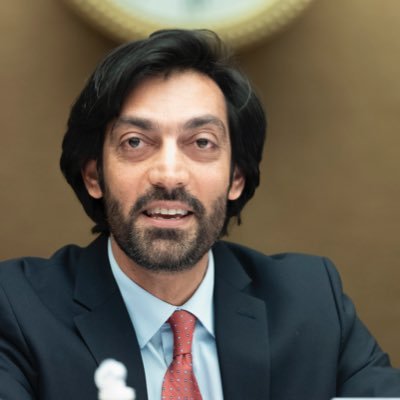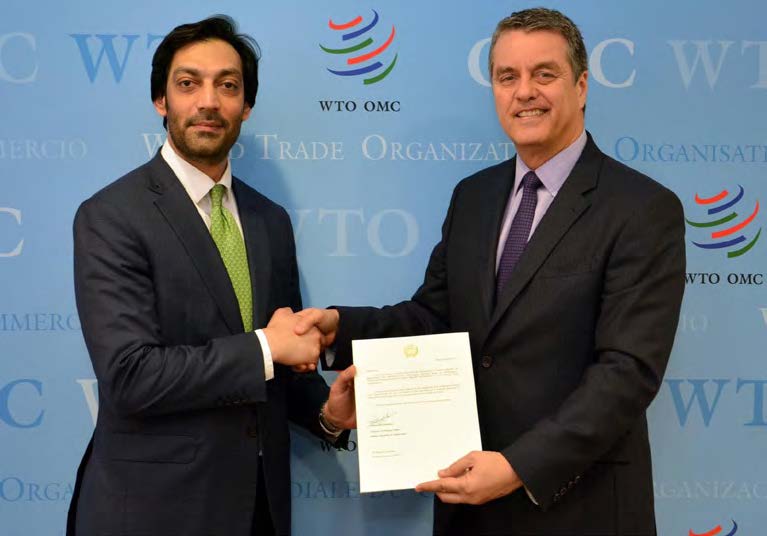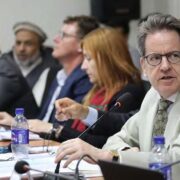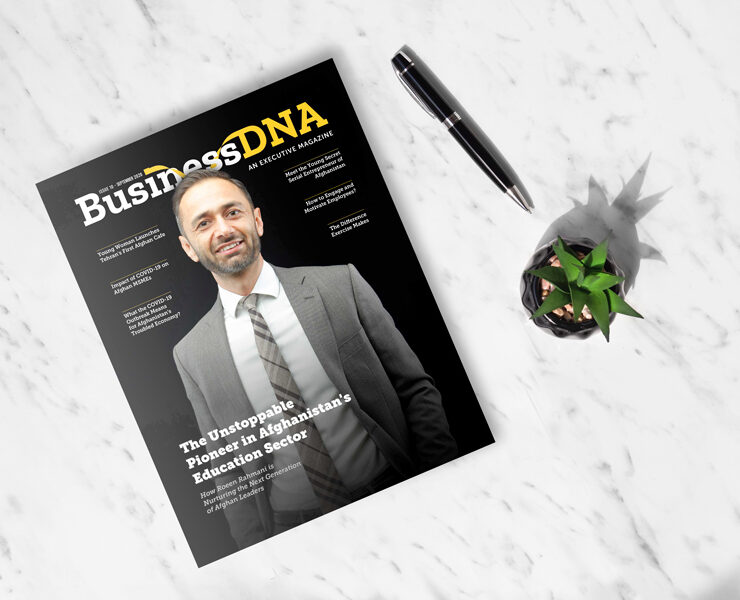An Interview with Mohammad Qurban Haqjo, Ambassador and Permanent Representative of Afghanistan to the WTO, Geneva

By Shabnam Sharifi Nacimiento who is an international economic relations specialist and the senior editor at BusinessDNA
Afghanistan became a member of the WTO in July 2016. What are the benefits of being a member of this international organization?
Thanks for the question, let me respond to it with the following 6 points:
First, being a member of a world-class organization such as the WTO enables Afghanistan to rebrand its economy and build a positive image, globally. The WTO membership means that Afghanistan’s legal and institutional frameworks comply with the international rules and standards. It signals to businesses, and particularly foreign investors, that Afghanistan is committed to the international laws and best practices, which will gain local and foreign investors’ trust and confidence to do business with and in Afghanistan.
Second, Afghanistan now has better access to the markets of 163 countries under a single trading regime provided by the WTO. This means our traders can conduct their businesses and access information without discrimination.
So, there is a single system for most-favorite-nation (MFN) tariffs, cross-border trade procedures, standards, and technical regulations and tools for addressing trade constraints and restrictions. The system simplifies trade procedures for exporters and importers of goods and services among WTO members.
Third, the utilization of WTO’s dispute settlement system is another advantage. If there is a trade dispute among members, the WTO’s binding dispute settlement mechanism would help countries settle trade disputes peacefully.
Fourth, Afghanistan’s WTO commitments push the country to further pursue domestic reforms and build its human and institutional capacities, accordingly.
Fifth, the WTO provides tailored technical assistance and capacity building programs to its members, especially to the least developed members like Afghanistan to build and diversify its production and trading capacities.
Last, as a member of the WTO, Afghanistan has a superior bargaining position in bilateral negotiations with acceding governments. Currently, three neighbors of Afghanistan, namely Uzbekistan, Iran, and Turkmenistan are in the process of accession.
Other applicant countries whose markets Afghanistan has an interest in include Azerbaijan, Belarus, and Iraq. This means that Afghanistan can bargain for more demanding concessions with regards to market access for goods and services from these countries. For these reasons and the fact that today 99% of the global trade takes place among WTO members, the WTO membership is a necessity, not a choice anymore.
Could you name five major accomplishments following Afghanistan’s accession to the WTO?
First, Afghanistan established the National Trade Facilitation Committee (NTFC) to carry out WTO-related activities and develop WTO post-accession strategy by increasing coordination among different ministries, government agencies, and private sector representatives.
Second, Afghanistan established a dedicated Mission to the WTO, through which we have been promoting the positive image of Afghanistan among WTO members and the Geneva-based community, in addition to our regular work to strengthen our relations with the WTO and participate in its activities diligently.
Third, Afghanistan already fulfilled the majority of its 37 commitments required by the country’s Protocol of Accession.
Fourth, despite being a new member, Afghanistan has been actively participating in the work of the WTO and has been chairing main WTO bodies.
Fifth, based on the WTO-related policy reform requirement, we developed Afghanistan’s first national export strategy and the Afghan national trade policy.
Last but not least, in recent years our economy has been showing improvements and our exports have been growing, despite insecurity and political uncertainty. There may be other reasons for this, but the main factors behind these economic achievements are the WTO-related reforms, implementation of new laws and regulations, and improvement of the capacity of public institutions. These efforts have resulted in more jobs and government revenues, access to affordable goods and services, and better living standards. I will give you an example. More than 200 Afghan officials have already benefited from WTO’s training and workshops in the past three years. Now they are good negotiators and policymakers. Moreover, Afghan traders can now export to markets of other WTO members. The opportunities are there for them. But do they use it? It is a different question. They need to build their capacity, adjust their products according to international standards, and overcome transportation challenges to export goods abroad.
WTO membership means a balance of rights and obligations. In brief, what are Afghanistan’s obligations under the WTO?
There are technical and substantive obligations. At the substantive level, our first responsibility is to ensure that Afghanistan’s domestic laws and regulations are in line with the WTO principles
and requirements.
Second, we are obliged to implement WTO multilateral agreements.
Third, as a newly acceded member, our responsibility is to implement various commitments that we undertook during our accession negotiations. These commitments are binding, and we are obliged to fulfill them.
Fourth, if we enter into new bilateral or regional trade agreements, we have to ensure that these agreements don’t violate WTO laws.
At the technical level, our obligations include the timely payment of membership fees, notification requirements for transparency reasons, etc. For instance, if there are any legal or institutional changes at the domestic level concerning trade, we have to inform all members about these changes through the WTO Secretariat.

What is the role of Afghanistan’s Permanent Mission to the WTO and how does it work?
Our role is to maintain and facilitate Afghanistan’s relations with the WTO. The Mission is the focal point between the Afghan Government and the WTO. So, we have four key activities:
First, at the multilateral level, we officially represent Afghanistan at the WTO. This includes participation in WTO meetings, decision making, panel discussions, and activities.
Second, we actively engage in WTO negotiations. This is an active form of representation. We do our best to participate in the WTO‘s negotiations and contribute constructively to the discussions. It is not mandatory, but it is up to each member to be either a rule-taker or a rule-maker.
Third, we make sure to maintain relations not only with the WTO but also with other Geneva-based international organizations that work in the area of trade and economy such as UNCTAD, WIPO, ITC, ISO, ITU, etc.
Last, we communicate bilaterally with other members, not only on trade issues but also on issues such as e-commerce, investment facilitation, etc. In the case of the Asia region, for instance, these kinds of bilateral meetings help us protect our common interests at the multilateral level.
Many countries have one Permanent Mission or Delegation to the United Nations (UN), the WTO, and the other international organizations in Geneva. Afghanistan already had a Permanent Mission to the UN and other organizations. Why did the government decide to establish a separate Mission to the WTO following its accession?
The WTO is a very technical organization, so a country requires a technical Mission to establish meaningful and close relations and communication with it. It is worth investing more in this organization to reap the full benefits of global trade. Afghanistan has around 66 embassies and consulates around the world. With some of these countries, we don’t even have any trade relations, but we have established embassies there to maintain only political relations. However, prioritizing trade, business, and investment issues is critical for the economic development and the prosperity of Afghanistan. So, it is worth having a dedicated Mission to the WTO that benefits our economy and opens up our exports and trade further to broader levels.
The WTO has been on the verge of crisis mainly because of the so-called “US-China trade war”. What are the implications of these tensions for Afghanistan?
The trade tension between these countries – as recent statistical data shows the stability of the global economy and growth – but it has not had any negative impact on Afghanistan yet. In the case of trade diversion, eventually, it could lead to trade gains for Afghanistan as has been the case for other trade winners like Vietnam, Mexico, India, etc. For instance, agriculture is the dominant sector in Afghanistan, and China heavily relies on the imports of some agricultural products from the US. If China imposes higher tariffs on American goods, it is no longer viable for US farmers to export their goods to China. Here, Afghan farmers could fill the void by exporting their products to China.
How could Afghanistan help avert the crisis and protect the stability of the multilateral rule-based trading system?
Each member has the choice to be either part of the problem or the solution. Of course, Afghanistan has chosen to be part of the solution. We support solution-oriented initiatives and encourage all members to focus on priorities and mandates, which helps protect the multilateral trading system.
How influential is Afghanistan at the WTO?
Despite being a new member of the WTO with many constraints and challenges, Afghanistan has already begun to play a leading role in the organization. We, first, co-founded the g+7 WTO Accessions Group, which aims at facilitating the integration of post-conflict and fragile economies into the multilateral trading system through the WTO accession process. Then, Afghanistan became responsible for the chairmanship of the Working Group on Trade, Debt, and Finance. Now, we became the chair of the Committee on Trade Facilitation. Besides, we chair South Sudan’s accession Working Group.
This is the first time in the history of the WTO that an LDC is leading the accession process of another country.
In parallel to this, we joined different groups at the WTO such as the developing Asian Group, G90, LDCs, LLDCs, Article XII, women in business, and WTO’s joint initiative on micro, small and medium-sized enterprises (MSMEs) which aims to support MSMEs’ participation in international trade. In the future, we are also considering joining investment facilitation and e-commerce initiatives.

How do you, with a small team of four diplomats and two support staff, manage to assume additional responsibilities at the WTO?
Based on our annual action plan, we focus on what is more important to us. We prioritize our preferences by focusing on issues related to trade and transit facilitation through the implementation of the Trade Facilitation Agreement (TFA), Duty-Free and Quota-Free (DFQF) market access, S&DT provisions, and contribute to the mandated negotiations in the area that is benefiting LDCs such as agricultural negotiations and economic structural transformation. Of course, we are focused a lot on maximizing the usage of WTO resources such as capacity building and technical assistance programs.
Private-sector participation in trade negotiations is essential to safeguard its interests. Do any mechanisms exist for Afghan business and industry associations to put their point of view to the governmental policymakers and negotiators during trade negotiations?
Yes. The National Trade Facilitation Committee (NTFC) is comprised of representatives from both the private and public sectors. All WTO matters are discussed there with the private sector. In addition, the private sector is actively participating in the meetings of the High Economic Council, the Council of Ministers, as well as the Executive Committee on Private Sector Development of Afghanistan (PRISEC).
What is Afghanistan’s current balance of trade and how does it affect the country?
Unfortunately, our balance of trade is substantially negative. Our imports are 88 percent of Gross Domestic Product (GDP) and our exports are only 12 percent of GDP. The imbalance is a huge number for a country like Afghanistan. It undermines the productivity of our economy, slows the growth, and leaves us fragile against external shocks. However, thanks to different programs and initiatives in recent years our production sector has been boosted and our exports have been increasing. For instance, between 2015 and 2018, the export increased exponentially by 53 percent.
In Afghanistan, which sectors demonstrate the highest export potential?
Traditionally, agriculture is the main sector in Afghanistan. For instance, our dry and fresh fruits, herbal seeds, and saffron have good chances of export if we could add more value domestically
by processing and packaging them properly and overcome logistic and transportation challenges. Nowadays, Afghan handicrafts are also becoming popular and have a high potential
for export growth. However, we want to diversify our exports. We aim to attract more investment in the extractive sector and increase the export of minerals while ensuring that a substantive amount of value addition takes place inside the country.
Another sector that has the potential for growth is the service sector, such as professional services, freelance outsourcing services, information and communication (ICT) related services, etc. Afghanistan has a competitive advantage in these services.
First, we have many talented Afghans that are fluent in multiple languages who could provide, for instance, telecommunication services to other countries.
Second, in Afghanistan, the wages are lower, and we could provide these services cheaper compared to other foreign service providers.

What are the best markets for these exports?
While we are enhancing opportunities in current markets, such as India, Pakistan, Central Asia, Turkey, and the Gulf region, we gradually move on to more sophisticated markets, namely the EU, the US, and far East Asia like Singapore that demand higher standards.
You’ve recently announced your support for e-commerce. How can e-commerce or online trade help an Afghan businessperson, or a local farmer go global?
E-commerce can help them sell products directly to end-consumers in foreign countries by eliminating intermediaries. According to the United Nations Conference on Trade and Development (UNCTAD), 90 percent of cross-border e-commerce is business-to-business (B2B), and only 10 percent is business-to-consumer (B2C). Afghanistan’s Rapid e-Trade Readiness Assessment indicates that the country is well-positioned to benefit from e-commerce because of its dynamic IT sector.
However, there is a significant need for a coherent approach, a good legal framework, and sound development policies to help upgrade existing skills, build consumer trust in online trade and improve access to finance for MSMEs.
The trade volume between Afghanistan and Pakistan has decreased while it has increased with other neighboring countries following the establishment of alternative trade and transit routes. How do you describe Afghanistan’s economic relations with its neighbors?
Unfortunately, our relationship with Pakistan is not as great as one desires because it is mostly influenced by politics. As a land-locked country, we rely on our neighbors to conduct trade in the region using their land and seaports. However, now that we are a member of the WTO, Pakistan’s refraining itself from any obvious WTO-rules infringement, and our economic relationship is gradually improving. In addition, we have managed to diversify our transit and transport routes. Fortunately, we are enjoying better relations with China, Iran, Uzbekistan, Tajikistan, and Turkmenistan because they have more trade and transit-friendly policies. The new routes such as Lapis Lazuli, rail connection with Uzbekistan and China, Chabahar port, and especially the establishment of the different air corridors, open new gates for Afghan exports and imports in the region and beyond.
Have there been any cases of discrimination against Afghan goods and/or services in foreign markets since the country’s accession to the WTO? If yes, how did the country resolve them?
Not that we are aware of. Except that our exporters, from time to time, face some difficulties at Karachi port and when trading to India through the Pakistani land port called Wagah, due to some transit-related challenges in Pakistan. So, we are looking forward to settling these issues and our trade and transit relations getting normal. Both countries need to conduct trade and transit with good faith based on a broader mutually beneficial economic prospect and vision and, of course, using the WTO disciplines and agreements, alongside benefiting from the regional and bilateral arrangements.
How does Afghanistan ensure that its traders are aware of the rights and obligations of each WTO member under the WTO laws?
First of all, the WTO is an intergovernmental organization, meaning private business and non-governmental organizations do not directly engage with the WTO, but they can address issues related to the WTO through their governments. In Afghanistan, NTFC, Ministry of Industry and Commerce (MoIC), the Afghanistan Chamber of Commerce and Investment (ACCI), other chambers, and our trade unions are responsible for dealing with private businesses to address and raise trade-related issues to be addressed by the government.
Besides, we leverage our official social media platforms, including my personal account, and publish newsletters to raise awareness about our activities and international trade issues. Our commercial attachés around the world also play a major role in keeping businesses up to date concerning recent changes and developments.
If an Afghan trader finds out that a WTO member violates the MFN or National Treatment principles, what actions does the trader have to take?
They could address their complaints by contacting the MoIC as well as their respective chambers and unions. And, if they are based abroad, they should reach out to Afghan embassies and consulates and get in touch with our commercial attachés.
You spent more of your career working inside Afghanistan. This is your first mission abroad. How do you describe the difference?
In Afghanistan, I was dealing mostly with domestic issues while here I am dealing with multilateral matters. It has been a unique journey – of course, very demanding and full of challenges. I had to familiarize myself with the new environment while representing an LDC and boosting its image simultaneously.
Additionally, setting up a new Mission from scratch was challenging. Sometimes it feels as if there is a lot to be done, but we have the resource and implementation constraints. It is slightly frustrating, but I don’t lose hope because I know it is part of the process and the best days are ahead of us.
Tell us about some of the greatest challenges you have faced as the Ambassador of Afghanistan to the WTO?
First, we had to deal with many logistical issues, such as communication challenges with the capital for the timely transferring of our budget. In the beginning, we also faced settlement challenges in Geneva for finding office space and managing higher living costs, etc. Moreover, our colleagues in the capital used to lack technical expertise concerning the WTO as it was a new area, so it took time to receive their input concerning our inquiries. But, we have been improving. So far, we have built our human capacity and improved our communication and coordination with Kabul as well as in Geneva.

What particular goals Afghanistan’s Mission intends to achieve by 2025?
We will continue our efforts to rebrand Afghanistan’s economy as productive, vibrant, and dynamic by highlighting and illustrating the success stories of our achievements that are not overshadowed by the negative news. Also, we intend to facilitate more market access for Afghan exports to all WTO members using the preferential market access such as DFQF and play an active role in the new negotiations concerning e-commerce and investment facilitation to ensure the inclusion of LDCS and conflict-affected countries’ needs and perspectives. Moreover, we want to increase our technical capacity so that we could reap the full benefits of our membership.
By 2025, we have to properly implement technical agreements, such as the TFA, the agreements on Trade-Related Aspects of Intellectual Property Rights (TRIPS), Technical Barriers to Trade (TBT), and Sanitary and Phytosanitary Measures.
Last, we will also start negotiating our accession to the Agreement on Government Procurement (GPA).
What do you like about Switzerland?
I like the landscape diversity in Switzerland and four-season weather. Within half an hour’s drive, you can go to the mountains, beautiful valleys, and beaches. Also, I appreciate the language and cultural diversity, particularly in Geneva, where people speak French, English, and German, and one could meet different nationalities from across the globe.
Does it remind you of any similarities with Afghanistan?
Yes, indeed, particularly when it comes to diversity issues. Swiss people are diverse and speak different languages, but they have built a strong and united nation in the middle of Europe. Geographically, Switzerland is a landlocked country like Afghanistan. When it comes to the economy, Switzerland was traditionally an agricultural country that gradually became industrial. From a political standpoint, Switzerland values neutrality in its global affairs similar to Afghanistan in the past. In other words, Switzerland stands for peace and so does Afghanistan.
Any final thoughts you would like to share with BusinessDNA?
The world is expecting more from Afghanistan than before. Previously, we would blame the war, corruption, and other challenges for our lack of progress. But we have run out of excuses not to address our shortcomings. I see this within the WTO. This implies that we need to get serious in
fulfilling our international obligations, contribute proactively and constructively to the international community, and promote synergy and cooperation. We have to become resilient as a nation and prepare for any internal or external shocks.
We have to continue building on our success stories and strengthen our existing systems instead of going back to build from scratch.
We need to become competitive. For this, we have to get creative, innovative, think out of the box, and work harder. That is what makes us a leading nation.
One final question – an important one indeed. We are in Geneva – Switzerland’s most cosmopolitan city, and it is 6 pm. What are you planning to have for dinner?
… I haven’t thought about that [yet]. I usually eat at home and I tend to eat less in the evening. But, my most favorite dish here is Lebanese as well as seafood.








